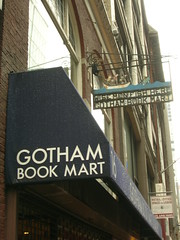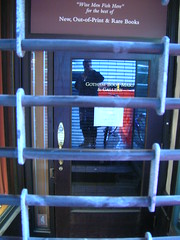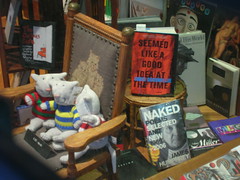The Internet is Killing Independent Bookstores
In all the good done by the internet and technological innovation, it’s easy to sometimes overlook that some changes haven’t been for the better. On Monday, the news everywhere was mentioning the odd and sensational story of the bookstore owner in Kansas City, Missouri, who has started burning books on his doorstep to dramatize his perspective that people are not reading books nearly as much anymore. While I’m afraid his belief that people are reading less is faulty, his observation of the trend in people shopping less at stores like his is correct. I’ve personally witnessed the closing of hundreds of indie bookstores all across America, and there’s no question that the rare book shops and independent book dealers have been under siege and endangered as a species for about ten years. The internet has been killing them.

Burning book – photo used by express permission
of the photographer at Prospero’s Books.
There are worse crimes than burning books,
one is not reading them. ~ Joseph Brodskey
A few weeks ago, I was in New York attending the Search Engine Strategies Conference, and I took a few minutes to walk a few blocks south to the grand old Gotham Book Mart to get a friend back home a birthday present. I knew that the Gotham had moved a couple of blocks over in 2004 from its original home on West 47th (in Manhattan’s famous “Diamond Way”), to East 46th. The Gotham was always a place that gave me the warm fuzzies — it’s been around since the 1920s and was the sort of commercial home to one of my favorite author/illustrators, Edward Gorey, and it was a long-running meeting place for the Finnegans Wake Society and the James Joyce Society. Every spring, I tried to make a point of visiting their annual exhibit of rare old Goreyanna books and illustrations, and I’d typically be enchanted into buying something.
 Â
 
“Wise Men Fish Here”, sign over Gotham Book Mart (Left)
Chained door with author’s reflection (Right)
The shop was famed in the book world for its appreciation of humor with its “Wise Men Fish Here” sign above the door, its love of books, and its support of book collectors. It was with extreme shock that I found the Gotham locked up tight and the lights out. There was a terribly tragic air about it, because there were a number of cute stuffed Gorey characters still sitting in the window in their little rocking chairs. With a sinking feeling in my heart, I knew that store was dead, and that this was the end of an era.

Gorey stuffed characters, sitting cozily
in their small rocking chair in the
window of the closed Gotham Book Mart.
I didn’t even have to research whether my assumption about the fate of the Gotham was accurate or not. I’ve seen literally hundreds of similar cases across the US, so this was yet another in a sad procession of dying book shops. Even so, I was terribly impacted by this closing — so much so that I could only stand and stare at the closed store, and I came very close to breaking down and weeping in the street. This shop was owned by three generations of a family!
Just a week ago, the final nail was hammered into the coffin of the Gotham, when a court commanded that the contents be put up for auction to repay the building owners for back-rent. To put insult on injury, the entire contents of the shop didn’t go out to the small crowd of book lovers who attended this tragic funeral, but instead it was snatched up in a single bid by a lawyer from the landlord’s corporation for $400k! Not only did the greedy landlords drive this piece of American heritage out of business, they circled in like vultures and took the inventory for what will likely turn out to be a steal, considering the potential individual value of many of the items that were there.
As I mentioned, I’ve seen this before, though on a less-dramatic scale, across the US. Another great example is the famous landmark shop in Boston that I had shopped at by mail-order since high school, and occasionally in-person in recent years when Verizon would send me up to meetings at our Labs facility in Waltham. Avenue Victor Hugo was well-liked by the literati of Massachussetts as well as collectors across the world, and they were forced to close down their brick-and-mortar shop just a few years ago by the rising rents in the trendy, yuppie shopping area around the Boston Commons. Fortunately for them, they were able to make the transition over to online sales, though new generations of book lovers will not have the experience of discovering fascinating works while browsing through their shadowy stacks. For those interested, the Avenue Victor Hugo website homepage re-publishes a diatribe of twelve reasons why small and independent book sellers have been dying.
I started collecting books back when I was in high school (I know, I’m a geek). In childhood, I’d become utterly fascinated with the surreal and unusual stories of Alice’s Adventures in Wonderland and Alice Through the Looking-Glass by that old Victorian mathematician, Lewis Carroll. The books seemed to hint at hidden meanings and were semiological in construction. I later chanced upon a new book in the late seventies called “The Wasp in a Wig, or A Suppressed Episode of Through the Looking-Glass and What Alice Found There“, and I was enchanted to see that it was published by something called “The Lewis Carroll Society of North America“. I was transfixed! Here was a club of people spread out all over the states who shared my passion for the works! Membership included prominent physicists, mathematicians, Victorian scholars, famous writers (such as science fiction writer Harlan Ellison and Scientific American columnist, Martin Gardner), and book collectors and dealers. I promptly joined and became indocrinated through exposure to the shadowy subculture of the book collecting world.
Book collecting was a more formal and rigorous affair in the 1980s. If you were like me and were a young high school student or college student, you couldn’t travel to all the myriad book dealers in order to collect your favorite stuff. You visited the ones you could in person when travelling, but then you had to contact all the rest who specialized in your area of interest and request their catalogs be mailed to you. These sales lists were published with varying frequency and print quality. Entries were in a sort of very specific code that you had to be trained in to be able to decipher. Example:
[Dodgson, Charles Lutwidge – pseud: “Lewis Carroll”] The Hunting of the Snark – an Agony in Eight Fits. London: Macmillan and Co.: 1876 (fours) 8vo. pp. [xiv] + 84 + [2], signn, [a], b, B-L^4,[M]^2. Illus, Henry Holiday. 1st ed., 1st print. Incl Macmillan adverts at end. Generally issued in buff-colour cloth, this specimen w/ black. All edges gilt.
Fine and uncut…………………………… $ 4,000.
Even amongst avid book readers, hard-core book collecting is a fairly esoteric practice. Failure to know the book description code jargon and the proper “points” for identifying a first printing versus and fifteenth could mean the difference between buying a gem for $10 or bying a terribly overpriced dog for $1,000. I learned the trade the hard way, devouring hundreds upon hundreds of bookmen’s catalogs and purchasing stuff for my own collection. I was further encouraged by my alma mater, Texas A&M University, which held a yearly “book collector’s contest” which I entered and won multiple times. The monetary prizes went into buying even more books, of course. I also dabbled in “book scouting” wherein I’d buy scarce books at my local used book shops and then resell them at a considerable profit to shops from San Francisco to London.
“When I have money, I buy books. If any money is left over, I buy food and clothes.”
(Quote attributed to Desiderius Erasmus Roterodamus, circa 1500s A.D., via a very loose paraphrasing.)
But, the internet and the modern world have changed the whole game. The sport of hunting for particular books in little, out-of-the-way shops has been replaced by shopping from home on the computer from sites like eBay, Amazon, and Google Products. One no longer needs to visit shops in person to be able to browse their inventories, and one can easily see comparative pricing of books from many sources. The concept of “artificial scarcity” and “perceived rarity” have been destroyed when you can easily see a dozen sellers offering identical copies of any given book. It’s now all devolved down into buying from the cheapest source.
Further, coldly capitalistic mega-corporation, chain-bookstores like Books-a-Million, Borders, and Barnes & Noble have also impacted these shops, much as Wal-mart has caused the death of many a traditional old main street store.
The change has not been for the better.
Book shops specializing in all sorts of esoterica have been put out of business, with nothing equivalent left in their places. The experiential nature of visiting these often-eccentric shops has been obliterated.
An industry which supported experts and specialists has been disappearing as fast as any endangered species in the world, and there’s nothing to replace it. Who will be left to learn the difference between the truly collectible first edition and the book club edition? The grand old sport of book collecting has been killed, making carefully-developed knowledge less necessary, and now the only real barrier to completist collections is money.
The specific, old book citation taxonomy is disappearing like a dead language, and consumers don’t even know what they’ve lost. Without a proper cataloging of identification points, they cannot know for certain whether the book they buy is truly worth the price they’re paying, or whether it’s just another common trade copy. Even worse, the casual and cheap approach has caused a huge increase in the criminal acts of forging author’s autographs on books, propagating the number of fraudulently enhanced books upon an ignorant populace.
Tom Wayne, owner of Prospero’s Books shop in Kansas City, has seen the undeniable symptom of the death of the subculture, even though his diagnosis of the cause is a little bit off in my opinion. People are not reading less, nor are they buying fewer books. The stock of Amazon.com, eBay, Barnes & Noble, and Borders Books have been holding steady or even increasing for the past five years. I see lots of people buying books at the big chainstores and in airport news kiosks. Consumers are all getting their books through online sources and the major book store chain stores.
Projects like Google Book Search will further impact the indie book industry as well as libraries and small press publishers. No longer will physical location be a barrier to the finding and reading of even the rarest of books. Entire libraries are being scanned in, and one day from the comfort of your home you’ll be able to read a copy of the rarest books found here-to-fore only in singular book shops or distant libraries in Europe. It’s pretty much already happening, but the scale of the change is still increasing.
I feel a huge sense of sadness while watching the passing of an era. We’re losing a big piece of heritage and culture that may never be regained, and we’ll all be diminished by its loss. As I stood in mourning in the street outside the Gotham Book Mart, I felt terribly guilty to be one of the many technologists who may’ve contributed in some small part to the demise of the independent book stores. How could we know back at the beginning what the ultimate impacts of our development would be?
As the indie bookshops are disappearing, and as the mega-bookstores and internet book outlets grow to replace them, there are still some hold-outs like Prospero’s Books. In order for most of these traditional shops to continue to have brick-and-mortar presences, they have had to begin embracing internet marketing and innovate ways to compete for some of the marketshare of the fast-food and Starbucks culture. There are some other examples of book shops which have successfully been managing the transition which I can think of off the top of my head:
Avol’s Bookstore in downtown Madison, Wisconsin — a terrifically cool shop with a mouth-watering inventory.
Powell’s Books – the largest independent used and new bookstore in the world, with its main shop occupying three stories and taking up an entire city block in Portland, Oregon.
Square Books appropriately located on the square in the tiny town of Oxford, Mississippi, just a few blocks from the home of William Faulkner.
If you love independent book shops and want to help preserve a fast-disappearing piece of culture, do your part in supporting them. Visit them. Buy from their online stores. Use the big mainstream outlets only when you can’t get what you need from the little guys. You may be surprised at what you can find, and you’ll be rewarded in the personal service you can get from them.
If you’re a struggling independent book store proprietor, please stay tuned and return back here in a few days. I’m going to perform an act of penance for my part in the internet technology age, and in a few days I’ll post some tips for how to market books within the online paradigm and in this modern age of the twenty-first century. Most of these tips will be geared to internet search marketing of books, but I’ll have a few brick-and-mortar book store tips as well, derived from my extensive travel and observations of shops across the country. Stay tuned!
Possible Related Posts
Posted by Chris of Silvery on 05/29/2007
Permalink | |  Print
| Trackback | Comments Off on The Internet is Killing Independent Bookstores | Comments RSS
Print
| Trackback | Comments Off on The Internet is Killing Independent Bookstores | Comments RSS
Filed under: General, Marketing books, bookstores, cultural-extinction, independent-bookstores, internet-bookstores, internet-economics, search-marketing


No comments for The Internet is Killing Independent Bookstores
No comments yet.
Sorry, the comment form is closed at this time.